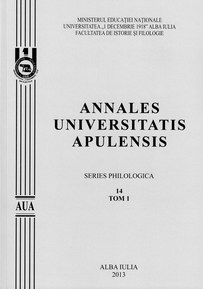„Diferite voci” în „Jocul de-a vacanţa” de Mihail Sebastian
Various Voices in Jocul de-a vacanţa (Holiday Games) by Mihail Sebastian
Author(s): Lucian Vasile BâgiuSubject(s): Literary Texts
Published by: Universitatea »1 Decembrie 1918« Alba Iulia
Keywords: chimera; evasion; failure; Fisher King; holyday; ideal; love.
Summary/Abstract: Our brief foray into the analyses of a subordinate character of Mihail Sebastian’s first play aims to exceed the simple emphasise of his rather over-simplified comic role to the proposal of a myth-criticism approach. It suggests that the apparent merry Major could be considered as a literary manifestation of a European everlasting grievous archetype, that of the Fisher King, both in its old Arthurian noble symbolism and its late decaying significance from Eliot’s The Waste Land. Jeff has the role of the immature confused boy who is in love with a young woman. He experiences an attraction which is never-ending, paralyzing, swallowing-up and impossible either to repress or to express. He is an unfit and helpless mute witness of the love story that is unfolding between the two grownups and protagonists, Corina and Ştefan Valeriu. He may also be regarded as a variable face of the mature hero, not in opposition, but in an intricate comrade relation. His “coming into being” experience may or may not develop into the failure outcome of the grownup. Madame Vintilă, an honest human being in her own way, yet mediocre and ordinary, rather frivolous, is a deconstruction of the feminine ideal. A mature woman, loquacious and voluptuous, who is presumably living back home a drab, petty life is looking for a way to unleash her sexual bedevils and accomplish her turbid dreams during a month of holyday. Agneş is outlined by means of her continuous absence from the stage, thus the young Hungarian servant becomes “a false diminutive Godot” of the play. Mister and Misses is an intruding risible couple that stands for the “real world” outside, thus invading like a morbid plague the chimeric realm of the holyday play. Their appearance stands for the ultimate confrontation between the two incompatible worlds, i.e. the sterility of the bourgeois quotidian and the escape into the phantasm. From this point onward the doom of the holyday ship is decided: the distress in the melancholy harbor where it left from.
Journal: Annales Universitatis Apulensis. Series Philologica
- Issue Year: 14/2013
- Issue No: 1
- Page Range: 285-300
- Page Count: 16
- Language: Romanian

